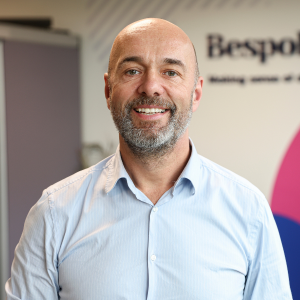
6 minutes
A marketing retainer doesn't just benefit your business - it strengthens your team.
In this video, Steve and Phil explore how a marketing retainer goes beyond lead generation. It helps develop your marketers' skills, fills the gaps, and results in a successful strategy.
We've helped a wide range of businesses see a commercial return from lead generation. We are sharing our knowledge based on this experience.
Steve: So Phil, we sometimes talk about this topic of retainers and you know, we've got lots of clients, we have lots of prospective clients we speak to as well and some have had a retainer forever for the marketing team. Some don't have a retainer and then there's some that come to us and they start a retainer for the first time as well. And one of the things we speak about is not just the retainer itself and the work we do, but the effect it has on the internal marketer or marketers, particularly teams of one, two, three or four in-house, you know smaller in-house digital teams. You've been on both sides of it, could you share a little bit about what happens when you've got a retainer, in particular, what's the impact on the team themselves?
Phil: When it's working really well, when you've got that perfect balance and combination of a good internal marketing resource within the business and then a really well-matched retainer, the two working together, you know, is that idea of two and two is five really. So generally you've got an in-house team that has, that, knows the internal systems really well. They know the product, they know the all the levers, they know the competition and you know, and they're a real value and asset to the company. But they may be missing some of the key elements that make them really succeed, such as a strong digital strategy, or some of the latest tech, or really understanding which tactics are going to bring the business success and that's what we bring. So if we can bring better strategy Innovations, we can really enhance them in their role and really help them to develop in their role, which in turn helps the business and helps sales or leads.
Steve: Yeah, so can we try, I want to try and take it to real life. I mean the principle makes sense, doesn't it? But a real-life example, and I'm trying to think of individuals we work with and individuals we've spoken to in particular scenarios. Let's go with, what's an example of someone that doesn't have the retainer in place that we've spent time with, been out to see and we can sort of see what difference it would make. Would you deal with that first?
Phil: One does spring to mind, I can think of a great client, a very well-established business, really successful in their area and their niche, and great reputation with clients, operationally superb. But perhaps lacking, they're not perhaps as digitally evolved as they'd want to be. Perhaps lacking some of the tools and skills internally to succeed, but they've got all the key bits that do matter. They've got great product knowledge, great knowledge of the competition, and they really know their area and I think a retainer with them would really help them fly. Because it will take all their all the assets and benefits that they're really good at, but we can overlay that with the knowledge that we've got from working with many other clients to quickly see where they need to get to. We can introduce this strategy, this technology and we can accelerate their performance as a business. But I guess the spin-off benefit of that, is that the marketing team and those individuals in that team will develop faster too.
Steve: I understand all that, but it must be important then that it's, if you're going to dovetail your team or your, might be your sole in-house marketer actually, or one or two with an agency team, then it must follow that it's go to be a match, a sector match team. You refer to something there about, they’re speaking about us, it will apply with other agencies as well. We've obviously got a picture of lots of different marketing departments, like as you and I sit here, we can probably, we can immediately picture 20, 30, 40 marketing departments and all the different tactics and different strategies, and different hiring that they've done. So we know what good is and we know what effective is, but that's only going to work if you've picked an agency in your sector or you know, that serves clients like you, I guess.
Phil: Yeah, I think that phrase you use which is ‘knowing what good looks like’, because we're working with many clients, you know, day-in day-out, week-in week-out, we know what good looks like straight away. We know we can quickly see the gaps, things that may not be apparent to an in-house team of marketers, which are going to be critical to next steps to evolving digitally. We can see it with clarity straight away and we can bring that to them.
Steve: So it sort of fills out the jigsaw of the marketing department.
Phil: It gets them there faster, yeah.
Steve: Okay, alright and maybe pull it all together, we could flip it around with examples of when it's working. So yep, straight away I think of a few, you know, just people that spring to mind who've been in to see us last couple of weeks. You know clients on the books, but I wonder what the impact is for the leadership there and for the business itself? I know that the people that we meet with, you might be the Head of Marketing or the Marketing Exec or so on, really happy when they come for the meetings, but it must be having an impact on those that oversee them as well? Because they're not having to do this, you know, benchmarking against how the rest of their industry or sector is doing.
Phil: If we can, you know, those roles that you've just mentioned, you know, the Marketing Execs, Marketing Managers, Heads Of, obviously, if we can really improve the performance of the business, and really improve them in their roles, and perhaps overlay strategy and tactics, that helps elevate them. But it also takes away some of the stresses from the leadership to know that it's in safe hands, or it's heading the right way, or they're making those leaps that are needed.
Steve: Sure, so we end up with a sort of best practice models in place eventually, and it's just stabilized by the continuity of the agency always being there, whatever happens with the staff even as well.
Phil: That's right and I guess it comes down to those first decisions. Are we a great match for them in their sector? Yes we are. They've got those internal processes, all that product knowledge, competition knowledge, and if we complement that with the technical, the tactical and the strategic, that's really powerful and we can get them there much faster.
Steve: Brilliant, thank you, Phil.

